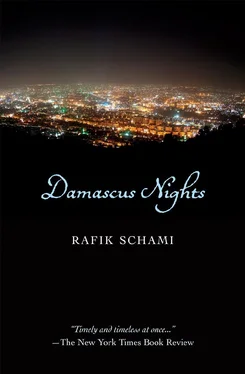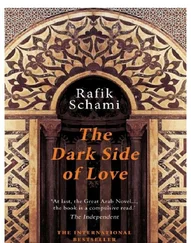Mehdi glanced at the rifles. Like the faces of the young soldiers, they were shiny and clean on the outside, but on the inside, charged and loaded.
That day, he had left his house, located near the French hospital, a little earlier than usual. He was overcome with a longing to see his childhood home on Bakri Street. It wouldn't take him very far out of the way. When Mehdi spotted the house, in which he had not set foot for over forty years, he was surprised at how tiny the door actually was; it had seemed like such a mighty gate when he was a child. His heart started pounding. As is often the case in Damascus, the front door was slightly ajar. He pushed it open. The smell of laundry and heating oil immediately came to greet him from the courtyard.
A small barefoot girl ran up to him. Mehdi smiled at her. "What's your name, little girl?"
"Ibtisam," the girl answered. Mehdi heard the clatter of wooden house shoes. An ample woman came out of the room that had once served his parents as a bedroom. When she saw Mehdi, she smiled, though slightly flustered. "That's the third time today she's gotten away from me! God is my witness, the devil himself would sooner fast and pray and make a pilgrimage than attempt to give these children a bath. Six of theiti, and each one like quicksilver! You just keep grabbing at nothing!" The woman paused and grabbed her daughter by the shoulder. "But come in! May I get something for you?" she invited Mehdi inside.
"No, thank you, I only wanted to have a look. You see, I was born in this house. We used to live here a long time ago. My grandparents, too. Mohammed Riad al-Karim — his name is chiseled in the marble plate above the door. That was my grandfather," Mehdi said, a little embarrassed.
"You don't say! And could you get water on the third floor in those days?" Without waiting for his answer, the woman continued: "For a year now the pressure's been so low it only flows down here. The neighbors from upstairs have to fetch their water from us, and every Saturday, when it's bath day, there's always a big fracas."
"No, back then there was enough water. How many families are living here now, anyway?"
"Three upstairs and two downstairs, plus one student, but he doesn't need much water. He always takes his wash home on the weekend. He's from Daraia. A very courteous man. Our little Ibtisam likes to sleep in his bed most of all. He really loves the children. But I keep telling them to leave the man in peace. You ought to see the thick books he plows through night after night!" The woman illustrated her speech with her hands.
Mehdi looked at the small room next to the staircase. "And who lives there?"
"In that little-bitty room? My dear man, God have mercy on your eyes! You think a human being could live in there? That room barely holds three oil heaters in the summer and two bicycles in the winter. Take another look!"
Mehdi was visibly shocked when he peered into the tiny room. He said goodbye quietly and left. And although his wife had asked him to buy fish for the next day at Batbuta's — right near Bakri Street — he forgot all about it. Batbuta the fishmonger was shouting so loud they could hear him in Turkey, but Mehdi walked quickly past his shop. Not even the pungent smell of fish could jolt him from his thoughts.
All six friends had already gathered at Salim's by the time Mehdi opened the door to the coachman's room. No one ever had to knock. Isam was kneeling in the corner in front of the wood stove, puffing away. The room smelled pleasant, like burnt resin. Mehdi closed the door behind him, just as Isam exclaimed, "Finally!" A little flame was glowing inside the pile of wood.
"I've run out of breath. I used to be able to blow a fire hot enough to roast a whole mutton to a crisp," Isam sighed and coughed.
"Good evening!" Mehdi greeted everyone and rubbed his hands; he was delighted by the tea's aroma.
The minister was the first to notice that Mehdi was wearing his brown suit, along with a white shirt and a brownish scarf made of silk.
"Have you been to a wedding?" he teased him, then stood up like the others and shook hands with his friend.
"All right, I'm going to start," Mehdi said after a short while and took a hefty swallow of tea, as if he wanted to prepare his vocal cords for the great task that lay ahead. "Now open your ears and your hearts. May God grant you health and a long life if you pay close attention to what I say," the teacher began.
"Just a moment, please," begged Tuma the emigrant as he took his glasses out of their leather case and put them on. The others grinned, because Tuma always insisted on wearing his glasses whenever he listened to their stories. "Okay, now I can pay close attention to what you're going to say," Tuma added, smiling contentedly.
"I'll never understand that," said Mehdi. "Old Socrates used to say, if one of his pupils was sitting without saying a word, 'Speak so that I may see you,' whereas you — you want to hear me with your eyes?"
"That's right, man," groaned Tuma.
"All right, but before I begin, I wish to confess to you, my dear friends, the reason why I like telling stories. I like to tell them because one story I heard as a child completely enthralled me. First let me tell you how I came upon this strange tale.
"I was a small child when my father, blessed may he rest in God's bosom, brought home a new apprentice. My father was a carpenter, and his new helper came from a faraway village. He was poor and had nowhere to stay in Damascus, so we cleaned out a little room by the stairs, and Shafak, as he was called, started living in this tiny room. The space seemed fairly large to me when I was a child, but in reality it's so small it can't even hold three oil heaters. In any case, I can still see his face exactly — it was completely covered with scars — although I can't remember how old he was. When he came home in the evening he would wash himself, eat, drink his tea and sit on a small chair in front of his room, smoke, and gaze up at the sky. He would sit there for hours without moving a muscle, just staring at the stars. Whenever the sky stayed overcast for more than a day, which rarely happened in winter, I would notice how uneasy he became. He would withdraw into his room, but stay awake long into the night. Since my room was opposite his, on the other side of the courtyard, I could see his room from my bed. I watched him every night. His room didn't have any electricity, so he always left the oil lamp on for a long time. Sometimes he would pace up and down. Whenever I woke up in the middle of the night to go to the toilet, he was always still awake, even though he had to get up early every day. My father, on the other hand, never once in his life managed to keep his eyes open after ten o'clock.
"All right, so my father liked him very much — mostly because he secured a huge commission the day Shafak started. 'I owe that to Shafak,' he said, 'his face is truly blessed.' He repeated that very phrase for years, whenever Shafak's name came up in conversation.
"Shafak was very shy and always spoke in a quiet tone of voice. Whenever my mother or my sister talked to him he would look down at the floor in embarrassment. The children from the courtyard made fun of his shyness, and had they not been afraid of my father, they would have pelted him with stones. My father, however, loved Shafak as if he were his own son.
"All right, to make a long story short, I was completely convinced that Shafak was a magician. And although I was curious even as a child, I never entered his room. I was a little afraid of him. In fact, my aunt made my mother secretly promise to keep him away from us children. 'Have you seen his eyes? They don't have any color. And his teeth? Have you seen his teeth, the way they're set in two rows? Two on top and two underneath,' my aunt muttered, full of fear.
Читать дальше












